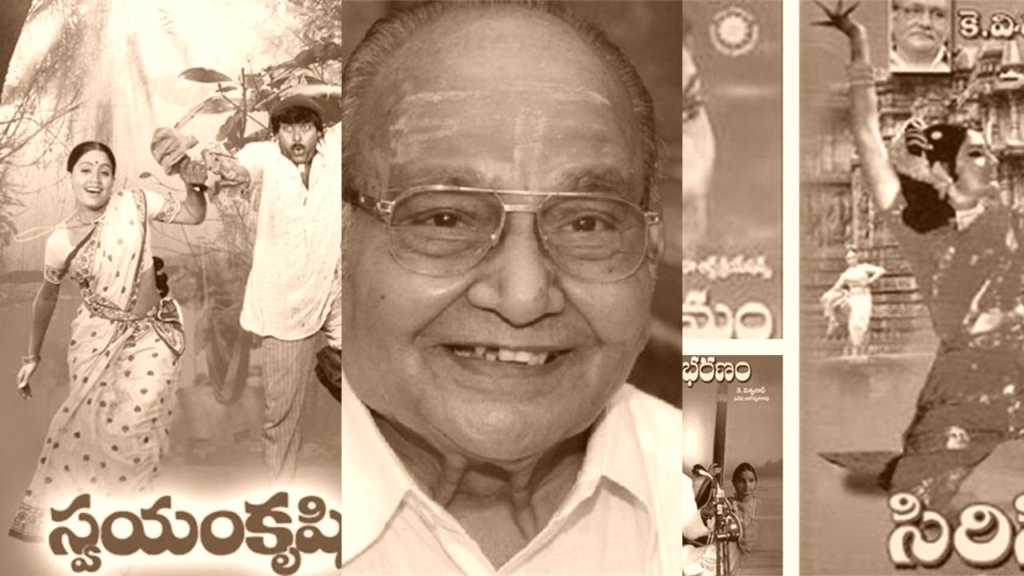“वेदानां सामवेदोस्मि” declared Lord Krishna in the Gita. The greatness bestowed on Samaveda by the Lord was due to the quality that differentiates Samaveda from the others – The Music.
शिशुरवेत्ति पशुरवेत्ति, वेत्ति गान रास: फणि:
This was the tag line of the cult movie Sankarabharanam and it explains the musical leaning of its director K Viswanath, who was the latest to get ‘Dada Saheb Phalke’ award.
If a director chooses the most handsome actors available in the stock to be the protagonist and then give him the role of a poet, who happens to be unattractive, what should he be called?
Perhaps, this was the juxtaposition that made K Viswanath stand out in the list of Indian directors. The actor was Sobhan Babu, one of the most handsome actors, Telugu film industry has ever seen and the movie was ‘Chelleli Kapuram’. The finesse Viswanath ensured in making the movie resulted in one of the best songs of SP Balasubramanyam (who is a a cousin of Viswanath), with many of Sanskrit words describing the ‘viraha’ of Radha in the first stanza and the ‘pralaya thandava’ of Rudra in the second one.
K Viswanath is one quintessential director whose films are simply – Indian. His vision was perhaps the most inclusive of true liberalism and spirituality.
Consider the movie ‘Sankarabharanam’, the movie was a musical drama, in which a higher caste Brahmin singer preferred a ‘prostitute’ with musical talent over the opinion of society. Perhaps, the true meaning of ‘Brahmana’ was conveyed in the film. This film was remade in Hindi as ‘Sursangam’ while the Telugu version ran to full houses in Tamilnadu, breaking the language barrier.
He was credited with helping Jayaprada reach the pinnacle of Indian films with the movie ‘Siri Siri Muvva’, remade into Hindi as ‘Sargam’. The predicament of a young wife in ‘Saptapadi’ when her husband considers her ‘goddess’ and start praying on their night of marriage consummation was one scene that stood as a peculiar example to the limitless imagination that Viswanath has.
Even the Malayalam superstar of yester years Mammootty played the role of how a mentor becomes jealous of his own protégé, whom he develops into a better singer. Viswanath’s ‘Swayam Krushi’ is one of the two classics even for Chiranjeevi, the other being ‘Rudra Veena’ by maestro Balachander. How the lure of money and associated habits make singers turning their art into a ‘profession’ and foregoing values was wonderfully depicted in ‘Sruti Layalu’.
Having two Bengali actors in a Telugu film also was possible only for K Viswanath, who got Pandit Hariprasad Chourasiya play flute, while Shiv Mani played drums and KV Mahadevan writing music for his master piece ‘Siri Vennela’. Sarvadaman Banerjee played the role of ‘blind’ flute player, while Suhasini Maniratnam acted as a ‘mute’ painter. Connecting dots between the blind and mute artists was Moon Moon Sen. The lyrics of this film have set such a trend, the lyricist Seetarama Sastry is called ‘Sirivennela Seetarama Sastry’ ever since.
And who forgets the ‘innocent’ Shivaiah played by Kamal Hasan? The film depicts how pure innocence ignores societal restrictions and customs as the guiltless protagonist ties knot to the widow. The film ‘Swathi Muthyam’ was remade into Hindi titled ‘Eeshwar’ and into Kannada ‘Swathi Muthu’. For the initiators, the pearl that was formed when the purest of rain drops enter the oyster is called Swathi Muthyam.
K Viswanath himself directed all Hindi versions of his originals. When he stopped making movies after 1997 with only two exceptions, he turned into an actor retaining his touch with the industry. In the days of hating anything that has its origins in India, Viswanath is perhaps the one who embraced all that was Indian and tasted both commercial and critical success. I still remember the scene in Sankarabharanam, where the Sankara Sastry delivers western musical nuance with finesse. Kudos to KV Mahadevan and SP Balasubramanyam too. While representing the elegance of fine arts, his stories always rooted in the ground realities of the society and discussed various issues that affected everyone – from casteism, egotism, self-depravity, personal problems to psychological problems of women, children and men too.
Hanuman has proved the name of Rama was more powerful than the Lord Rama himself. Similarly, by promoting the fine arts through the medium of cinema, K Viswanath established the power and effect of fine arts on the society. The tag line of ‘Sruthi Layalu’ interprets why the Lord Krishna choose to identify with Sama Veda.
त्रि वर्ग फलदा सर्वे दान यज्ञ जपादय, एकम संगीत विज्ञानं, चतुर्वर्ग फलप्रदं |
By doing donations, sacrifices and chants only three of four ardhas, namely dharma, ardha, kama can be achieved, while only the knowledge of Music provides Moksha, along with other three.
Congratulations to the Swara Rishi K Viswanath on being nominated for the highest award in Indian Cinema. May his life goes on like the Music, which he described ‘Sarasa Svara Suma Jhari Gamana’ that was the ‘Sama Veda Sara’.
